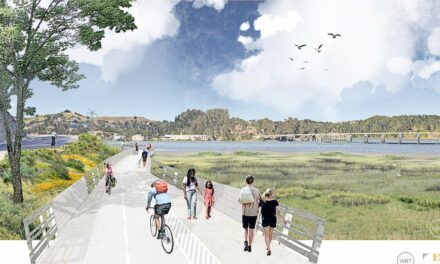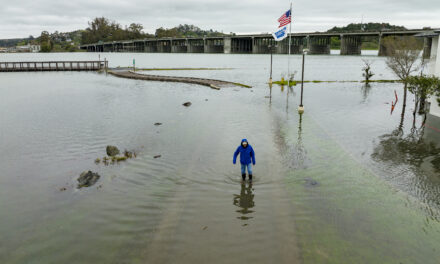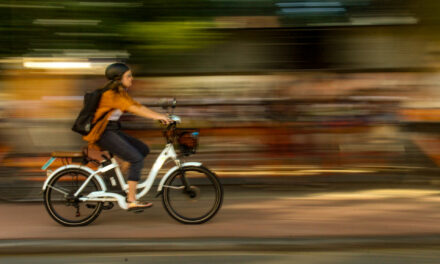Burning for Action
Contradictions and inspirations while reading Naomi Klein’s “On Fire” on the plane.
As if to chasten myself for my first flight in nearly three years, I bought a copy of Naomi Klein’s latest climate catastrophe book, On Fire, at the airport bookshop in San Francisco. Instead of a little escapist joy reading on my vacation flight to New Orleans, I chose a book that should convince us all to stop flying.
Perhaps my subconscious steered me to the book as a type of psychological carbon credit purchase, my enhanced climate education serving as some miserly compensation for my climate-thrashing air travel. Or maybe I just needed an eye-opening, heart-thumping, mind-widening wakeup call.
As we floated over the Southwest, across vast chunks of Nevada, Arizona, and New Mexico, the earth below revealed epic, searing beauties and tragedies: a sprawling, miraculous patina of snow-tinged Rocky Mountain crags; desert schmears of burnt orange, fiery red-brown, crimson and sere; alluvial beige, ribbon veins of rivers and former rivers snaking and oxbowing across the earth. Landscapes of surviving and dying.
Miles below lay a planet at once producing and decaying. Mines and factories in the lonely desert, scraping up and churning out ingredients for capitalism. Circles and pie-chart slices of water-dowsed green agriculture amid the replicated beige. Parched expanses of crusted earth, baking and cracking open, cratering much like the moon. Immense stretches of earth devoid of water or trees, absent seemingly of any life: a barrenness that is at once starkly beautiful and wrenchingly abandoned.
And what of our interior landscapes of survival and death? How do we navigate this apocalyptic, apocryphal journey of soaring and spiraling contradictions? As I flipped the book’s early pages while soaring across America’s achingly parched Southwest, the ironies pressed in on me: Here I am helping to destroy the planet, for a vacation, while reading and writing about it. But I’m not gripped by personal guilt, wherein lies an empty politics of individualism that goes nowhere useful. Klein alerts us that we are not just doing the wrong things to survive this crisis — we are thinking in the wrong ways.
On Fire soon transports me to a mental universe of searing urgency and clarity. The blistering urgency of climate upheaval — now documented as even more dire and irrevocable than we already knew — glares at me with unapologetic immensity and immediacy. Teenage climate warrior Greta Thunberg’s truth-telling reverberates across every corner of my consciousness (I only wish it reverberated across every corner of this country, still largely slumbering through apocalypse).
As Klein shows us, Thunberg’s ability to see our dying clearly, without filters or trauma-numbing distractions, is precisely what we need now. Our ways of “coping,” averting our eyes from the existential emergency, is killing us. Even what I’m doing right now, paying vigorous attention to the crisis while riding on a climate-ravaging plane, is deadly.
How can we keep flying, driving, and living so normally in such abnormal times? How is it that we don’t drop everything and laser-focus our hearts and minds, and all our societal will, on this most universally urgent crisis? Is my urge to take this trip part of our larger societal madness?
Driven to Distraction
From Klein, I learn that Thunberg’s perspective can educate us about this dilemma of distraction. Thunberg, you may recall, gained global recognition and inspired climate activism with a series of student climate strikes, starting bravely solo then joined by growing masses of fellow protestors, then appearing before audiences of world policy and business leaders.
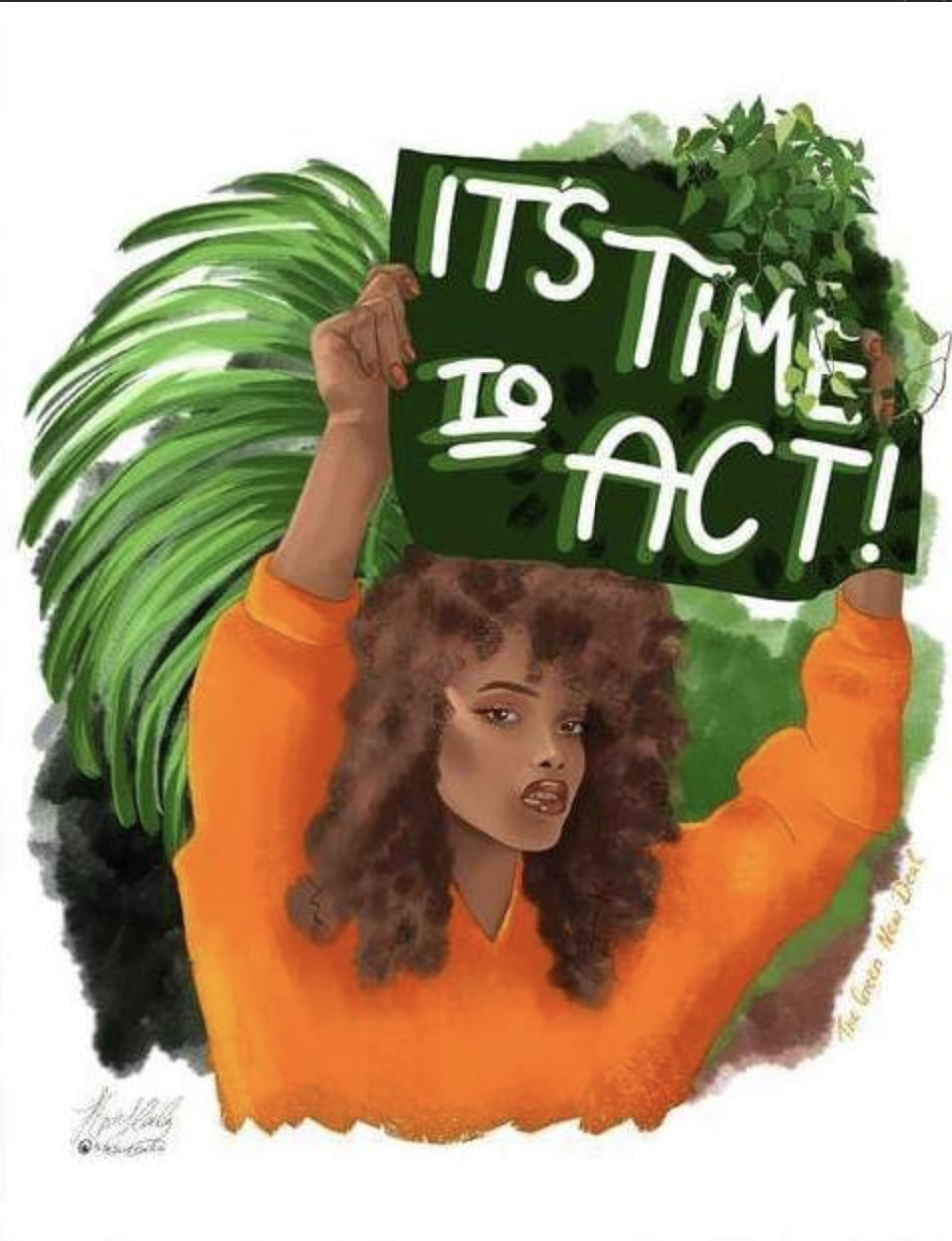
Green New Deal Poster. Courtesy Creative Action Network.
Speaking at the Davos G-8 summit, Klein chronicles, Thunberg told these “rich and mighty” powerbrokers, “I don’t want your hope … I want you to panic. I want you to feel the fear I feel every day.”
Feel fear and panic every day? People with autism, Klein explains, “often have trouble coping with cognitive dissonance, those gaps between what we know intellectually and what we do that are so pervasive in modern life.” Thunberg “saw and felt the full implications of the crisis and could not be distracted from it,” writes Klein.
Thunberg’s view of the world propelled her to scour her own life as free as possible of those frictions. This included switching to a vegan diet (and persuading her parents to do the same), dramatically reducing her diet-related emissions by cutting meat and dairy; and eliminating the very thing I was doing while reading On Fire — flying.
“If she desperately wanted powerful politicians to put themselves on emergency footing to fight climate change, then she needed to reflect that state of emergency in her own life,” Klein writes. Imagine how better off the planet could be if we all followed suit, not just as individuals but as a society.
As both Klein and Thunberg acknowledge, fixating on individual emissions purity is not going to repair the climate emergency, nor is it the primary solution, which must be systemic, economic, and policy-driven rather than individualistic and behavioral. But ignoring what Klein calls “the gap between what we know about the urgency of the climate crisis and how we behave” is not just a personal failing. This willful avoidance is part of our collective global failure as a species.
Our detachment from imminent doom makes sense from a daily coping standpoint, but also hastens our ending. In his book Invisible Nature, Kenneth Worthy, a researcher and lecturer at UC Berkeley, argues that our detachment from the ecological effects of our actions enables us to use up and trash our planet, as if it were a disposable product. “[T]he very structure of the modern world, the way that its elements are divided up and separated — dissociated — drives our ecological crisis,” Worthy writes.
Can’t we find ways to enjoy life, distract, and escape without destroying the earth? Of course we can, if we truly want to.
A House and a Planet on Fire
On Fire, Klein’s title, alludes to the climate emergency warning that our collective house is aflame. Perhaps it’s not your house or mine, your neighborhood or mine, your town or mine that’s burning today, but it will be, any time now. For those of us who have not experienced climate upheaval in a palpable way — flooding, severe drought, epic hurricanes, massive crop losses, forced migration — it may seem that our house is okay for now. But it’s not.
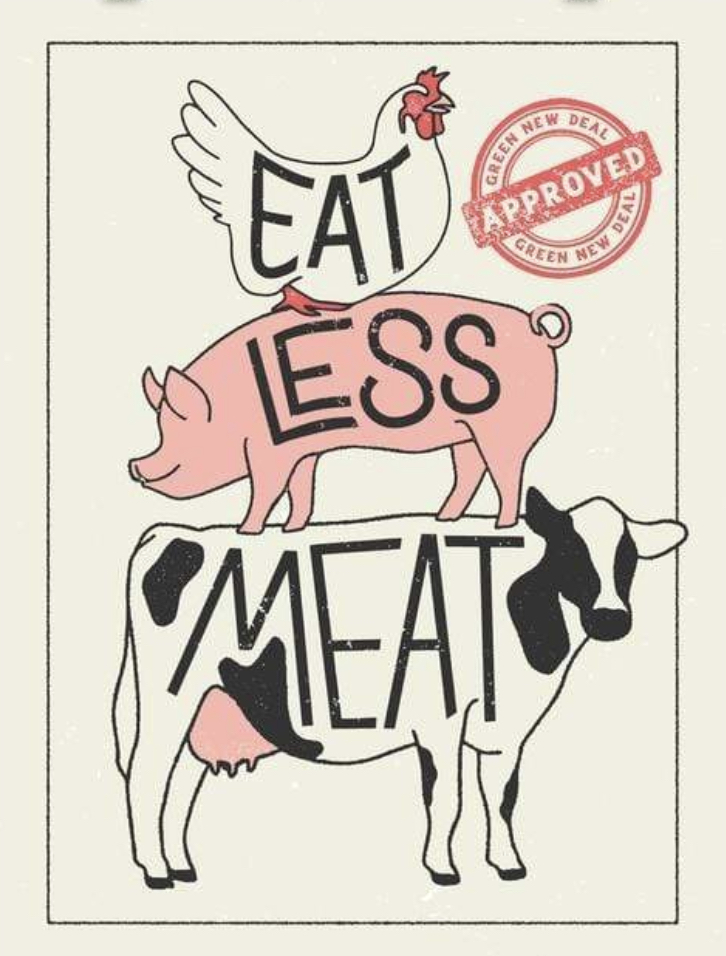
Green New Deal Poster by Sarah Bloom, Courtesy Creative Action Network.
Thunberg gets it right: “We cannot solve an emergency without treating it like an emergency.” It’s not only our house that’s on fire, but all of us.
But, in the face of these alarm bells, what are we to do? There is no one perfect answer, but there are many very good answers, on both micro and macro levels. Here are a few of my suggestions:
- We can live by the enduring environmental adage: reduce, reuse, recycle (and compost!).
- Fly far less — don’t fly unless we must.
- Drive far less — don’t drive unless we must.
- Buy less stuff — only what we need and used whenever possible.
- Eat as much organic, local food as possible.
- Eat less meat, or, better, none at all.
- Remember that curtailing individual consumption isn’t the solution, but one helpful response.
- Fight like hell for an entirely new politics and economy that prioritizes planetary health and survival over profits and growth. As Klein puts it, this involves “building political power — enough to change the calculus of what is possible.”
- Push and pressure hard for a bold and comprehensive Green New Deal that creates millions of jobs combating the climate crisis.
We’ve been warned of this onrushing catastrophe since the 1980s (some sounded the alarm even earlier). It’s too late now, after decades of urgent scientific warnings, for us to cease this irreversible slide, the science tells us. But this is not cause for hopelessness. Adaptation and harm reduction are critically important. If we act and make serious changes, we can still save many human lives and many species. We can give future generations a chance. That’s more than enough to fight for. The time for full-throttled action and life-saving triage is absolutely now.
GIF Art Top: Alyson Wong








